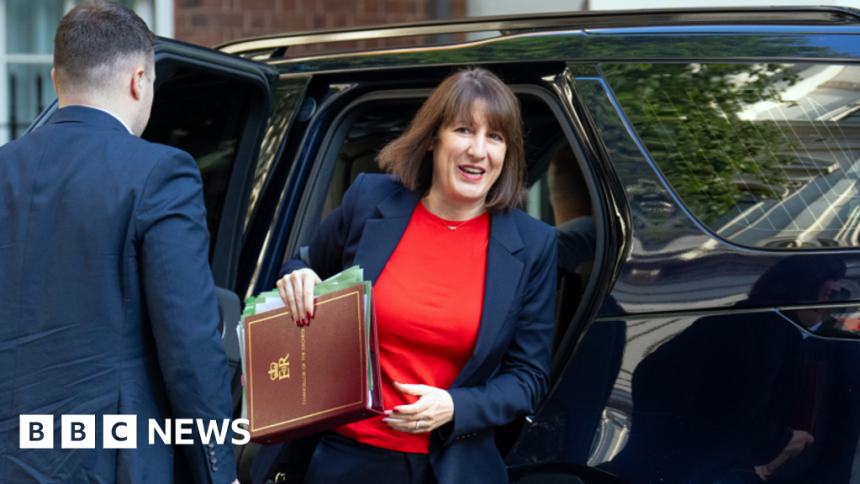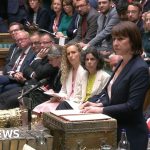Rachel Reeves’s spending audit at-a-glance
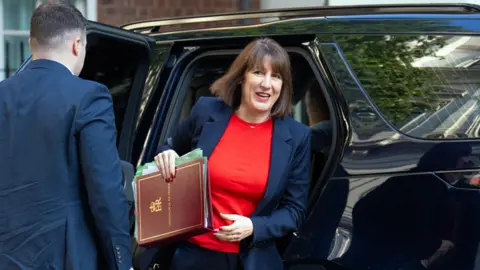 Getty Images
Getty ImagesThe chancellor has accused the Conservatives of hiding a £21.9bn government overspend this year, as she set out a series of spending cuts.
Rachel Reeves also warned that she would need to make “difficult decisions” on tax at the next Budget, set for 30 October.
At the same time, she has announced pay deals for public servants, and a deal to settle the long-running pay dispute with junior doctors in England.
Shadow chancellor Jeremy Hunt has denounced the audit as a “shameless attempt to lay the ground for tax rises” later in the year.
Here is a summary of the main announcements.
Spending ‘black hole’
The Treasury said it had identified a “forecast overspend” for this year of £21.9bn.
Ms Reeves said this represented spending over and above what was forecast at the time of the last Budget in March, including:
- £11.6bn to give public sector workers recommended pay rises that are bigger than the 2% budgeted for by the last government
- an extra £6.4bn on “undisclosed” asylum and immigration costs, and £1.5bn more to cover NHS pressures from strikes
- £1.7bn more in military support for Ukraine than was planned
- £1.6bn more in payments to private rail companies after a weaker than expected rebound in passenger demand after Covid
- higher than expected inflation since overall departmental budgets for this year were set in 2021.
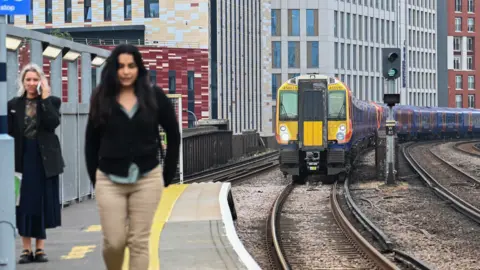 Getty Images
Getty ImagesShort-term cuts
Ms Reeves announced cuts worth £5.5bn this year, rising to £8.1bn next year, which she said were required to fill the shortfall, including:
- scrapping Winter Fuel Payments for around 10m pensioners who do not currently receive pension credit or other means-tested benefits
- scrapping a cap on the amount people in England pay for social care, scheduled to come into effect in October 2025
- cancelling a planned road tunnel under Stonehenge, the A27 Arundel bypass in Sussex, and ditching £76m to reopen previously closed rail lines
- cancelling plans for a new qualification to replace A-levels and T-levels in England, which Labour say was never allocated funding
- stopping “non essential” government spending on consultants, and unspecified “administrative efficiencies” for the Civil Service
- scaling back government communication and marketing spending, and selling “surplus” public sector buildings and land.
Public sector pay
The chancellor also announced pay deals for millions of public sector workers this year, accusing the previous government of sitting on the decision.
These decisions did not have to be announced today, but Labour says the Conservatives had ducked making a decision earlier this year.
- she has accepted advisory recommendations to give most NHS workers, teachers and members of the armed forces above-inflation pay rises of 5.5-6%
- she said the rises represented “the pay rise they deserve” and would ensure the government can recruit and retain staff
- the government has also offered junior doctors in England a two-year pay deal worth 22% on average, in a bid to halt strike action.
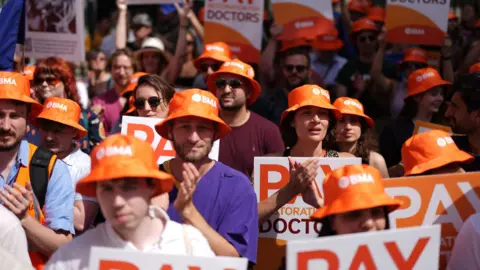 PA Media
PA MediaTax increases
- The government has confirmed its manifesto pledge to charge 20% VAT on private school fees will begin in January 2025
- it confirmed details of its plan to replace non-domiciled tax status with a new residence-based regime from April 2025
- the windfall tax on the profits of energy and gas companies will rise 3% from November
- Ms Reeves also said she would need to make further “difficult decisions” over “spending, welfare and tax” at the autumn Budget.
Longer-term actions
The chancellor also said longer-term measures were required to “restore public spending control”:
- reviewing the previous commitment to build 40 extra hospitals by 2030, which the spending watchdog has said would be missed
- setting up a new arm’s length body, the Office for Value Money, to monitor the effectiveness of public spending
- a bid to increase public sector efficiency through greater use of artificial intelligence (AI).



